Philipp Wiesner
Efficiency Will Not Lead to Sustainable Reasoning AI
Nov 19, 2025Abstract:AI research is increasingly moving toward complex problem solving, where models are optimized not only for pattern recognition but for multi-step reasoning. Historically, computing's global energy footprint has been stabilized by sustained efficiency gains and natural saturation thresholds in demand. But as efficiency improvements are approaching physical limits, emerging reasoning AI lacks comparable saturation points: performance is no longer limited by the amount of available training data but continues to scale with exponential compute investments in both training and inference. This paper argues that efficiency alone will not lead to sustainable reasoning AI and discusses research and policy directions to embed explicit limits into the optimization and governance of such systems.
What happens when nanochat meets DiLoCo?
Nov 14, 2025Abstract:Although LLM training is typically centralized with high-bandwidth interconnects and large compute budgets, emerging methods target communication-constrained training in distributed environments. The model trade-offs introduced by this shift remain underexplored, and our goal is to study them. We use the open-source nanochat project, a compact 8K-line full-stack ChatGPT-like implementation containing tokenization, pretraining, fine-tuning, and serving, as a controlled baseline. We implement the DiLoCo algorithm as a lightweight wrapper over nanochat's training loop, performing multiple local steps per worker before synchronization with an outer optimizer, effectively reducing communication by orders of magnitude. This inner-outer training is compared against a standard data-parallel (DDP) setup. Because nanochat is small and inspectable, it enables controlled pipeline adaptations and allows direct comparison with the conventional centralized baseline. DiLoCo achieves stable convergence and competitive loss in pretraining but yields worse MMLU, GSM8K, and HumanEval scores after mid-training and SFT. We discover that using DiLoCo-pretrained weights and running mid- and post-training with DDP fails to recover performance, revealing irreversible representation drift from asynchronous updates that impairs downstream alignment. We provide this implementation as an official fork of nanochat on GitHub.
$β$-GNN: A Robust Ensemble Approach Against Graph Structure Perturbation
Mar 26, 2025
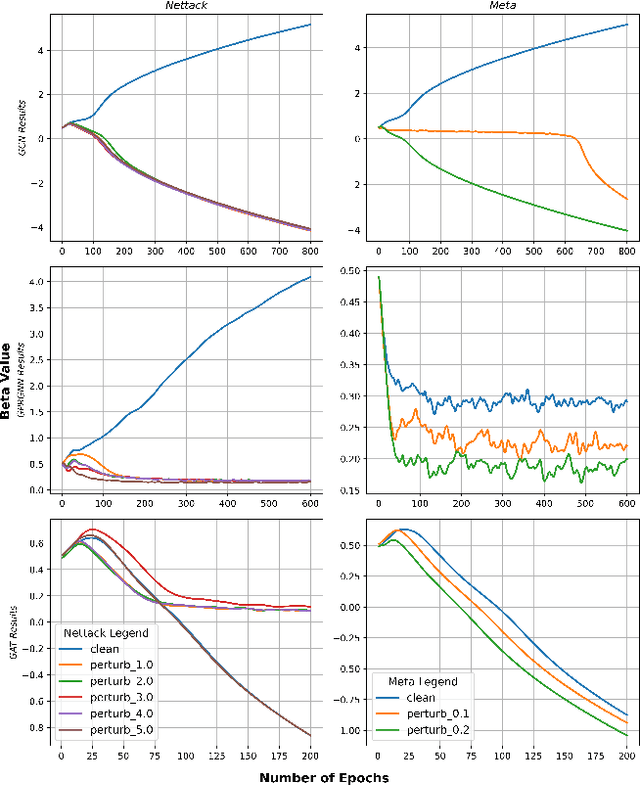
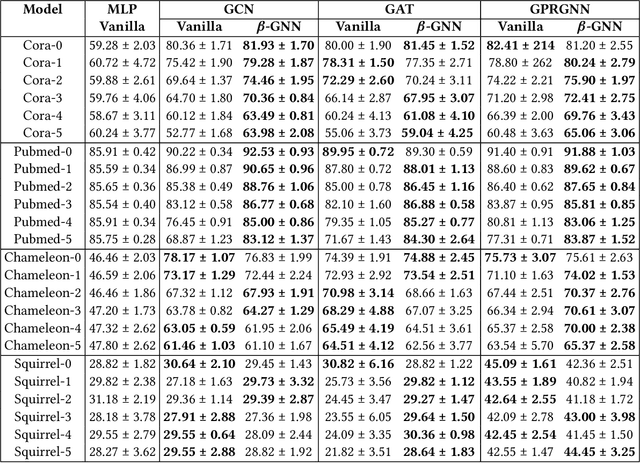
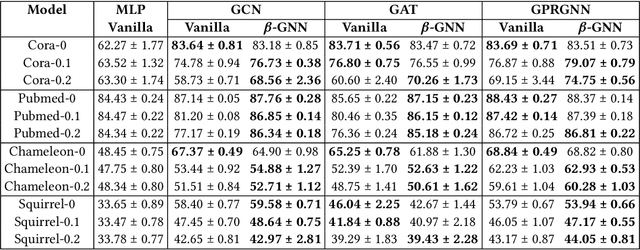
Abstract:Graph Neural Networks (GNNs) are playing an increasingly important role in the efficient operation and security of computing systems, with applications in workload scheduling, anomaly detection, and resource management. However, their vulnerability to network perturbations poses a significant challenge. We propose $\beta$-GNN, a model enhancing GNN robustness without sacrificing clean data performance. $\beta$-GNN uses a weighted ensemble, combining any GNN with a multi-layer perceptron. A learned dynamic weight, $\beta$, modulates the GNN's contribution. This $\beta$ not only weights GNN influence but also indicates data perturbation levels, enabling proactive mitigation. Experimental results on diverse datasets show $\beta$-GNN's superior adversarial accuracy and attack severity quantification. Crucially, $\beta$-GNN avoids perturbation assumptions, preserving clean data structure and performance.
LogRCA: Log-based Root Cause Analysis for Distributed Services
May 22, 2024Abstract:To assist IT service developers and operators in managing their increasingly complex service landscapes, there is a growing effort to leverage artificial intelligence in operations. To speed up troubleshooting, log anomaly detection has received much attention in particular, dealing with the identification of log events that indicate the reasons for a system failure. However, faults often propagate extensively within systems, which can result in a large number of anomalies being detected by existing approaches. In this case, it can remain very challenging for users to quickly identify the actual root cause of a failure. We propose LogRCA, a novel method for identifying a minimal set of log lines that together describe a root cause. LogRCA uses a semi-supervised learning approach to deal with rare and unknown errors and is designed to handle noisy data. We evaluated our approach on a large-scale production log data set of 44.3 million log lines, which contains 80 failures, whose root causes were labeled by experts. LogRCA consistently outperforms baselines based on deep learning and statistical analysis in terms of precision and recall to detect candidate root causes. In addition, we investigated the impact of our deployed data balancing approach, demonstrating that it considerably improves performance on rare failures.
Solution Simplex Clustering for Heterogeneous Federated Learning
Mar 05, 2024Abstract:We tackle a major challenge in federated learning (FL) -- achieving good performance under highly heterogeneous client distributions. The difficulty partially arises from two seemingly contradictory goals: learning a common model by aggregating the information from clients, and learning local personalized models that should be adapted to each local distribution. In this work, we propose Solution Simplex Clustered Federated Learning (SosicFL) for dissolving such contradiction. Based on the recent ideas of learning solution simplices, SosicFL assigns a subregion in a simplex to each client, and performs FL to learn a common solution simplex. This allows the client models to possess their characteristics within the degrees of freedom in the solution simplex, and at the same time achieves the goal of learning a global common model. Our experiments show that SosicFL improves the performance and accelerates the training process for global and personalized FL with minimal computational overhead.
Karasu: A Collaborative Approach to Efficient Cluster Configuration for Big Data Analytics
Aug 22, 2023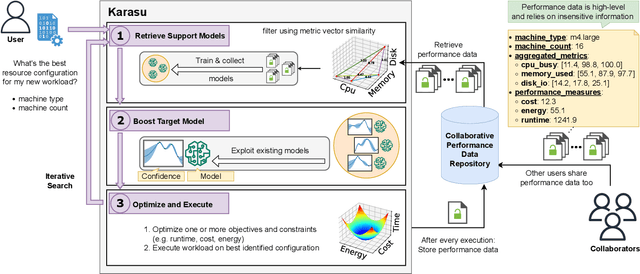
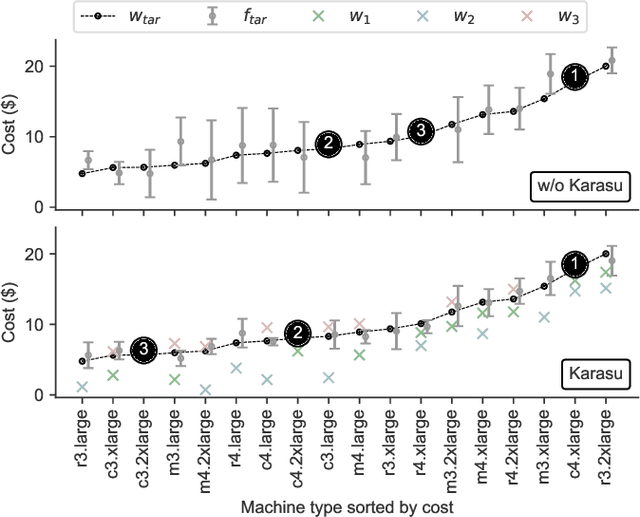
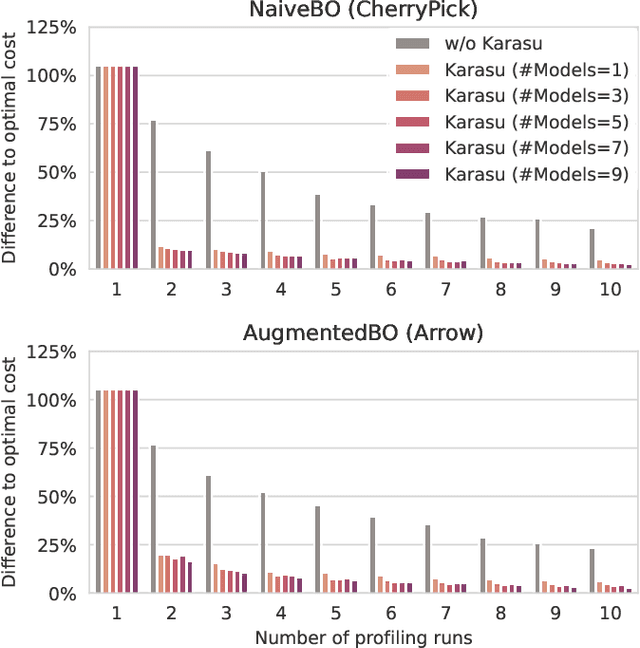
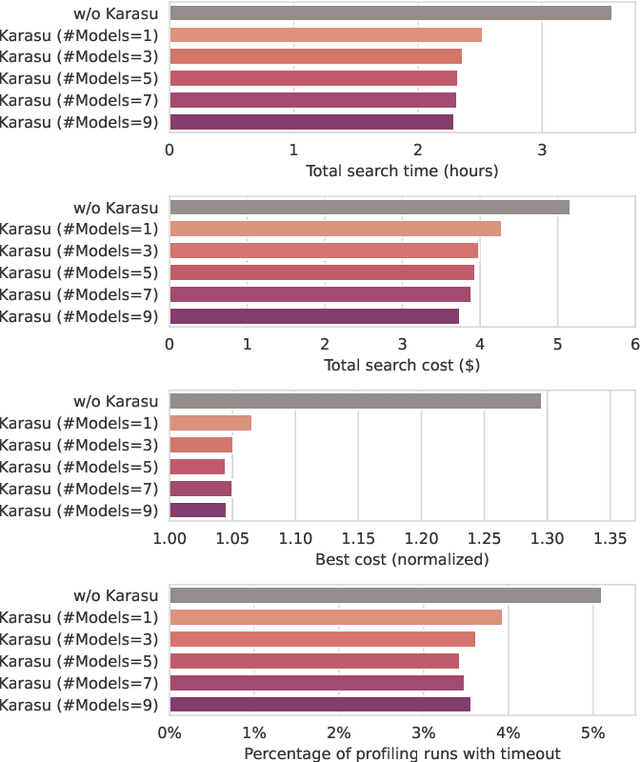
Abstract:Selecting the right resources for big data analytics jobs is hard because of the wide variety of configuration options like machine type and cluster size. As poor choices can have a significant impact on resource efficiency, cost, and energy usage, automated approaches are gaining popularity. Most existing methods rely on profiling recurring workloads to find near-optimal solutions over time. Due to the cold-start problem, this often leads to lengthy and costly profiling phases. However, big data analytics jobs across users can share many common properties: they often operate on similar infrastructure, using similar algorithms implemented in similar frameworks. The potential in sharing aggregated profiling runs to collaboratively address the cold start problem is largely unexplored. We present Karasu, an approach to more efficient resource configuration profiling that promotes data sharing among users working with similar infrastructures, frameworks, algorithms, or datasets. Karasu trains lightweight performance models using aggregated runtime information of collaborators and combines them into an ensemble method to exploit inherent knowledge of the configuration search space. Moreover, Karasu allows the optimization of multiple objectives simultaneously. Our evaluation is based on performance data from diverse workload executions in a public cloud environment. We show that Karasu is able to significantly boost existing methods in terms of performance, search time, and cost, even when few comparable profiling runs are available that share only partial common characteristics with the target job.
FedZero: Leveraging Renewable Excess Energy in Federated Learning
May 24, 2023Abstract:Federated Learning (FL) is an emerging machine learning technique that enables distributed model training across data silos or edge devices without data sharing. Yet, FL inevitably introduces inefficiencies compared to centralized model training, which will further increase the already high energy usage and associated carbon emissions of machine learning in the future. Although the scheduling of workloads based on the availability of low-carbon energy has received considerable attention in recent years, it has not yet been investigated in the context of FL. However, FL is a highly promising use case for carbon-aware computing, as training jobs constitute of energy-intensive batch processes scheduled in geo-distributed environments. We propose FedZero, a FL system that operates exclusively on renewable excess energy and spare capacity of compute infrastructure to effectively reduce the training's operational carbon emissions to zero. Based on energy and load forecasts, FedZero leverages the spatio-temporal availability of excess energy by cherry-picking clients for fast convergence and fair participation. Our evaluation, based on real solar and load traces, shows that FedZero converges considerably faster under the mentioned constraints than state-of-the-art approaches, is highly scalable, and is robust against forecasting errors.
PULL: Reactive Log Anomaly Detection Based On Iterative PU Learning
Jan 25, 2023Abstract:Due to the complexity of modern IT services, failures can be manifold, occur at any stage, and are hard to detect. For this reason, anomaly detection applied to monitoring data such as logs allows gaining relevant insights to improve IT services steadily and eradicate failures. However, existing anomaly detection methods that provide high accuracy often rely on labeled training data, which are time-consuming to obtain in practice. Therefore, we propose PULL, an iterative log analysis method for reactive anomaly detection based on estimated failure time windows provided by monitoring systems instead of labeled data. Our attention-based model uses a novel objective function for weak supervision deep learning that accounts for imbalanced data and applies an iterative learning strategy for positive and unknown samples (PU learning) to identify anomalous logs. Our evaluation shows that PULL consistently outperforms ten benchmark baselines across three different datasets and detects anomalous log messages with an F1-score of more than 0.99 even within imprecise failure time windows.
A Taxonomy of Anomalies in Log Data
Nov 26, 2021Abstract:Log data anomaly detection is a core component in the area of artificial intelligence for IT operations. However, the large amount of existing methods makes it hard to choose the right approach for a specific system. A better understanding of different kinds of anomalies, and which algorithms are suitable for detecting them, would support researchers and IT operators. Although a common taxonomy for anomalies already exists, it has not yet been applied specifically to log data, pointing out the characteristics and peculiarities in this domain. In this paper, we present a taxonomy for different kinds of log data anomalies and introduce a method for analyzing such anomalies in labeled datasets. We applied our taxonomy to the three common benchmark datasets Thunderbird, Spirit, and BGL, and trained five state-of-the-art unsupervised anomaly detection algorithms to evaluate their performance in detecting different kinds of anomalies. Our results show, that the most common anomaly type is also the easiest to predict. Moreover, deep learning-based approaches outperform data mining-based approaches in all anomaly types, but especially when it comes to detecting contextual anomalies.
LogLAB: Attention-Based Labeling of Log Data Anomalies via Weak Supervision
Nov 25, 2021Abstract:With increasing scale and complexity of cloud operations, automated detection of anomalies in monitoring data such as logs will be an essential part of managing future IT infrastructures. However, many methods based on artificial intelligence, such as supervised deep learning models, require large amounts of labeled training data to perform well. In practice, this data is rarely available because labeling log data is expensive, time-consuming, and requires a deep understanding of the underlying system. We present LogLAB, a novel modeling approach for automated labeling of log messages without requiring manual work by experts. Our method relies on estimated failure time windows provided by monitoring systems to produce precise labeled datasets in retrospect. It is based on the attention mechanism and uses a custom objective function for weak supervision deep learning techniques that accounts for imbalanced data. Our evaluation shows that LogLAB consistently outperforms nine benchmark approaches across three different datasets and maintains an F1-score of more than 0.98 even at large failure time windows.
* Paper accepted on ICSOC 2021 and published on springer
 Add to Chrome
Add to Chrome Add to Firefox
Add to Firefox Add to Edge
Add to Edge